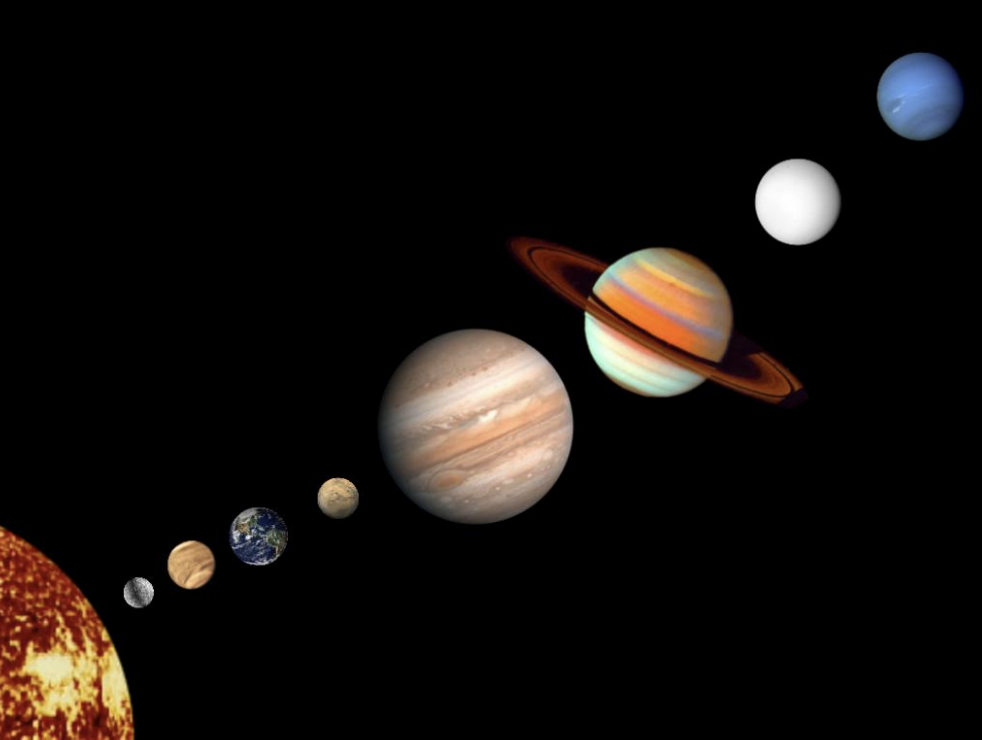
Solar System Vocabulary Flashcards

Overview
Science topics such as the Solar System require students to be able to identify scientific terms by picture just as much as writing down the definition. Students will be creating Solar System Vocabulary Flashcards using Google Slides. Students will be using the Explore tool to search for definitions and pictures.
Learning Objectives
Students will:
- Be able to use Google Slides.
- Be able to use the Explore tool in Google Slides.
- Be able to find a picture and define vocabulary about the components of the Solar System.
Vocabulary
Vocabulary Words:
- Solar System: A solar system is a gravitationally-bound system that consists of the Sun, planets, moons, meteorites, comets, and asteroids.
- Solar Energy: Solar energy is radiation from the Sun that causes heat.
- Galaxy: A galaxy is a system of stars, planets, moons, meteorites, comets, and asteroids that make up the universe.
- Orbit: The orbit is the path of a planetary body revolving around another planetary body.
- Planet: A planet is a body that circles the Sun without being in another object’s satellite.
- Moon: The Moon is the Earth’s only satellite and nearest and largest celestial body.
- Star: A star is a massive planetary body that is composed of gas.
- Sun: The Sun is the star in which Earth and the other planetary bodies of the Milky Way Galaxy revolve.
- Comet: A comet is a planetary body that is composed of ice.
- Asteroid: An asteroid is a minor planet that orbits between Mars and Jupiter in an asteroid belt.
- Meteor: A meteor is a metal planetary body from space.
- Meteorite: A meteorite is a planetary body from space.
- Kuiper Belt: The Kuiper Belt is a ring of planetary bodies made of ice that revolve around the Sun beyond the orbit of Neptune.
- Asteroid Belt: An asteroid belt is a flat ring of asteroids that orbit the Sun between Mars and Jupiter.
- Terrestrial Planet: A terrestrial planet is a planet composed of rock.
- Gas Giants: Gas giants are planets composed mainly of the gases hydrogen and helium.
- Dwarf Planet: A dwarf planet is a planetary body that is smaller than the other planets.
Pre-planning
To prepare for this lesson:
- Teachers need to make sure that each student has a computer and a Google account.
- Students need to have access to Google Drive and Google Slides. Students should be able to share Google Slides with the teacher and their classmates.
- Watch Google Slides the Complete Overview.
- Watch the video How to Use the Google Explore Tool.
- Explore the following websites and decide if you would like to use them with the students.
Accommodations
See Accommodations Page and Charts on the 21things4students.net site in the Teacher Resources.
Students can just find the picture online without including the definitions.
Steps
Directions for this activity:
- Students will log in to Google Slides. The students can create their own slides and share them with the teacher or the teacher can create a slide show template and share it with the student.
- The teacher will introduce the Explore tool by showing the students the video and/or demonstrating how to use the Explore Tool.
- The teacher will share one or more space websites with the students for them to explore.
- Students will create the Vocabulary Flashcards in this order:




Assessment Options
Different options for assessing the students:
- Observations
- Check for understanding
- Teachers can use the Solar System Vocabulary Flash Cards as the assessment. Students can also use the flash cards as a study tool for an assessment.
MITECS Competencies & ISTE Standards
MITECS: Michigan adopted the "ISTE Standards for Students" called MITECS (Michigan Integrated Technology Competencies for Students) in 2018.
Knowledge Constructor
3a. Students plan and employ effective research strategies to locate information and other resources for their intellectual or creative pursuits.
3b. Students evaluate the accuracy, perspective, credibility and relevance of information, media, data or other resources.
3c. Students curate information from digital resources using a variety of tools and methods to create collections of artifacts that demonstrate meaningful
connections or conclusions.
Devices and Resources
Device: PC, Chromebook, Mac, iPad
Browser: Chrome, Safari, Firefox, Edge, ALL
App, Extension, or Add-on:
Websites:
Google Slides the Complete Overview
How to Use the Google Explore Tool
Space.com Solar System Planets
CONTENT AREA RESOURCES
ELA
Students can write a report using the Solar System vocabulary words.
Integrated Arts
Students can make posters using the Solar System vocabulary words.
Math
Students can include data about the vocabulary words and use the data in math class.
Science
Students can create Google Slides for each of the planets in the Milky Way Galaxy.
Social Studies
Students can make a map using the Solar System vocabulary words.
Credits
This task card was created by Erin McDermott, Kent County, December 2021.


